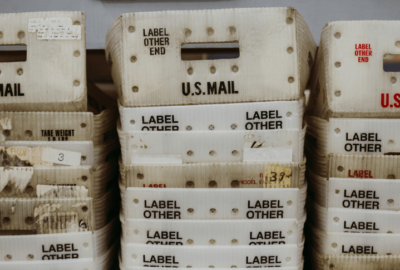

Former USPS Inspector General David Williams resigned from his position as the vice-chairman of the agency’s Board of Governors at the end of April.
With the Postal Service at risk of running out of cash in the coming months and negotiating with the Trump administration over the terms of a $10 billion loan, a senior member of the agency’s Board of Governors has stepped down.
Former USPS Inspector General David Williams, a longtime government watchdog with a career in public service, resigned from his position as the vice-chairman of the agency’s Board of Governors at the end of April.
The USPS governors operate much like a private company’s board of trustees, and make important business decisions for the agency, such as nominating a new postmaster general and controlling spending.
A Postal Regulatory Commission filing shows that Williams offered his resignation from the board on April 30. His term expired last December, but governors can continue to serve on the board for an additional holdover year after their term expires.
The board now has six total members: four appointed by President Donald Trump and confirmed by the Senate, Postmaster General Megan Brennan and Deputy Postmaster General Ronald Stroman.
USPS spokesman Dave Partenheimer told Federal News Network on Tuesday that the Board of Governors still has a quorum.
Williams in an email Tuesday night declined an interview with Federal News Network.
The board has been on the search for a new postmaster general to replace Brennan, who announced she would retire in January, but has indefinitely postponed her retirement pending the search for her successor.
The board expects to meet this Friday to discuss the agency’s quarterly financial and service performance reports.
Meanwhile, Trump on Monday nominated USPS Governor John Barger as one of three new members to serve on the Federal Retirement Thrift Investment Board, which oversees the Thrift Savings Plan.
Those three nominees need to go through the Senate confirmation process, but it’s unclear if Barger, whose term ends in December 2021, will continue to serve both roles if confirmed.
Prior to his roles at the Postal Service, Williams served as the IG for the Nuclear Regulatory Commission, the Social Security Administration and the Treasury Department.
A former Army military intelligence officer and Secret Service special agent, Williams also served as the first Treasury IG for Tax Administration and served on President Ronald Reagan’s Commission on Organized Crime.
Williams also served as director of the Office of Special Investigations at the General Accounting Office, before it changed its name to the Government Accountability Office.
In his capacity as a former USPS inspector general, Williams joined eight other former IGs in calling on House and Senate leadership to set up greater protections for the independence of agency IGs.
In a letter circulated by the Project on Government Oversight, the former watchdogs called on Congress to pass legislation that would limit the president’s ability to remove an IG, unless they are “ineffective or unwilling to conduct the rigorous oversight required of their office.”
“Without these protections, IGs may be reticent to follow an investigation to its conclusion if it could put them at odds with political leadership — something that has the potential to influence the conduct and outcome of IG audits and investigations,” the IGs wrote.
Trump last month fired intelligence community IG Michael Atkinson and effectively removed Glenn Fine, the Defense Department’s former acting inspector general, as the chairman of the Pandemic Response Accountability Committee by naming a new acting IG for the agency.
Fine remains in his Senate-confirmed post as DoD’s principal deputy IG, but Trump has named the Environmental Protection Agency’s permanent IG, Sean O’Donnell, to serve as the next acting DoD IG.
The president’s IG shakeup triggered bipartisan concern from senators, which requested a “more detailed reasoning” for Atkinson’s removal.
Meanwhile, Democratic leaders of 20 House committees have asked Council of the Inspectors General on Integrity and Efficiency Chairman Michael Horowitz for input on legislation that would protect the independence of IGs.
The letter notes that the Postal Service IG already has the statutory “for-cause” removal protection that they’re asking Congress to extend to other federal watchdogs.
These protections, the former IGs wrote, “do not make underperforming IGs untouchable.”
“If structured properly, these protections always reserve the right of any sitting president to remove an IG when they are ineffective or unwilling to conduct the rigorous oversight required of their office,” the letter states.
The former IGs also told congressional leaders that a list of watchdog candidates vetted by CIGIE should have hold more weight in naming and confirming watchdogs.
The 1978 IG Act requires CIGIE to send its list of recommendations to the president when presidentially appointed IG vacancy occurs.
The president isn’t required to choose from CIGIE’s list, but the former IGs said the president should explain how a nominee or an acting IG meets the IG Act’s qualifications
“While the president should not be required to choose someone from CIGIE’s list, the individuals therein have been pre-vetted as qualified by CIGIE and should be seriously considered by the president during the selection and nomination process,” the IGs wrote.
Copyright © 2025 Federal News Network. All rights reserved. This website is not intended for users located within the European Economic Area.
Jory Heckman is a reporter at Federal News Network covering U.S. Postal Service, IRS, big data and technology issues.
Follow @jheckmanWFED



